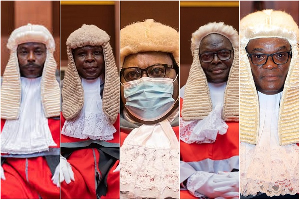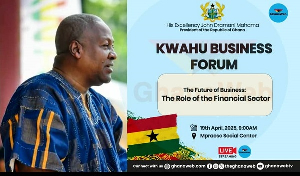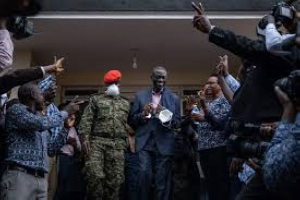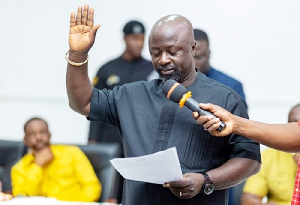“It is the right of every child and young person to have access to quality education, not only to be able to earn a living, but also because only a nation of educated, skilled, well informed and morally sound people can build a just and prosperous society”.
(NDC Manifesto for Better Ghana Agenda – 2008)
The above educational policy statement gives a flavour of the importance the National Democratic Congress (NDC) attaches to its Manifesto commitment on education under the Better Ghana Agenda 2008 programme. The NDC government’s pledge to work towards this goal was demonstrated during the government’s previous terms of office.
During the period between 1996 – 2000 the NDC government embarked upon a major expansion of education infrastructure, creation of the GET Fund, vigorous drive to correct the gender imbalances between male and female enrolment at all levels of the educational ladder. These included the reform of the structure and conduct of educational system and increased in the enrolment from Basic to Tertiary levels. The NDC government established the University of Development Studies in the North, introduced Distance Learning to enable teachers to upgrade their skills and made possible for improvements to teacher training facilities. Because the NDC government wanted to extend education to all areas of the economy, standards were set for private participation in education.
The importance of these educational policy reforms to the NDC government was that the country has a moral responsibility to ensure that the talents of the nation’s young people were not wasted. And also to ensure that no impediments were put in their way in order to obtain high quality education. The ultimate aim was the establishment of an educational system, in a fairer society, where every child and young person would have access to good quality education irrespective of where they live, their parents’ background or income.
The NDC government believed a nation of educated, skilled, well informed and morally sound people could build a just and prosperous society. This would also ensure the country is able to compete on the global market and attract investments, which would result in the increased employment prospects of our youths.
The Educational legacy NDC Government inherited in 2008
When the NDC government led by President John Evans Atta Mills came to power, in January 2009, there was clear evidence that the country’s educational sector had suffered from 8years of systematic under- investment under the NPP Administration.
The NPP had boasted about unprecedented levels of investment in educational infrastructure and high levels of enrolment during their eight years in government. NPP government in 2008 reformed the educational system against the professional advice of the Committee of Experts set up by former President Kuffour - The Anamuah-Mensah Committee. For a whole academic year after introduction of the so called reforms, neither the syllabus nor a single textbook was made available to the students of the country. No comprehensive plans were drawn to build new additional school blocks to cater for the extension of the Senior High School (SHS) system from three to four years.
The table below bear testimony to the facts:
Schools Built or Established NDC (1993-2000) NPP ( 2001-2008)
Pre-school 6321 2362
Primary 12335 1013
JSS 6,414 853
Science Resource Centre 110 0
Polytechnics 7 0
Public Universities 3 0
Source: Anamuah-Mensah Cttee 2002 Report; Djanmah Cttee 2002 Report; Ansu Kyereme Cttee 2003 Report; Gbadamoshi Report: Preliminary Education Sector Performance Report (OESP) 2004-2007/08
Whilst the NPP claimed record levels of enrolment in our schools, the shocking reality was that in the 2006, an overwhelming 66% of all Senior Secondary School students in Ghana who sat SSS-CE failed. In 2007, the failure rate again stood at 60%. At the basic level, the story was equally sad- with massive failure rates all over the country.
This shows that under the NPP it was generally accepted that 60% of students would leave school without qualifications. Those lucky ones recruited into the NYEP were given limited opportunities to improve upon their skills. Whilst the cost of living was skyrocketing, amidst the affluent and lavish lifestyle of those in government, the condition of teachers worsened. Teachers were unhappy and underpaid. For over two years, newly recruited teachers did not receive payments of salaries and related allowances. Yet NPP did not understand the reasons for the low quality of education in our society.
The Educational Challenges facing the NDC government today
Making good 8 years of under investment in education and reversing the damage done to the country’s education system by the NPP are not easy tasks. These are bound to take time.
However, the NDC government’s resolve to work towards the reformation and improvements of the country’s educational systems, under the Manifesto for Better Ghana Agenda 2008, remains undiminished. After due consultation with stakeholders, the government reversed the duration of the Senior High School from the initial four years to three. This change will take effect from the next academic year.
We are at a loss as to how the NPP government would rush through the 2008 Education Reforms, increasing the SHS duration from three to four years, against all Expert Advice from the educational professionals and stakeholders.
We again ask: How could a whole government implement such a major educational reforms without making the necessary arrangements to construct additional classroom blocks or dormitories to cater for the overflow?
The worrying aspect of this narrow minded reform process is that in the next six months the first batch of students, on the four years SHS programme, are expected to enter their fourth year. But the schools do not have the additional classrooms and dormitories to cater for their current needs. Simply put most SHS would not be able to admit new students for the 2010/2011 academic year.
Investments in School Buildings
Whichever approach one takes to answering the above question, the NDC government is left with no alternative but to make good the mess that the previous government created for our educational system. To start with, the government has formed a task force to access the infrastructure situation of the Senior Secondary Schools towards the construction of additional classroom blocks for 170 SHS in the country.
In the interim, government has allocated GH¢45million for the first phase of this classroom project, which starts this April. Another 120 schools with infrastructural challenges would have dormitories constructed. The project is funded by the Ghana Education Trust Fund (GET Fund). In all, government is expects to spend GH¢225million on this condensed programme to mop up the mess left behind by the NPP government.
At the same time, government has also embarked on the construction of infrastructure facilities for SHS and upgrading of Technical and Vocational Institutes in Takoradi, Tema and St Paul Technical Institute to eliminate the shift system and the holding of classes under trees. Six hundred of such schools out of 3,047 that conduct schools under trees were being replaced with new classroom blocks.
It will interest readers to know that the NDC government has also provided funds towards the provision of infrastructural facilities for pre- school education across the country. Accordingly, MOE has embarked on the construction of 200 3-unit Classroom Blocks with ancillary facilities in 170 cost centres. This will be done in collaboration with District Assemblies and other non state agencies. Enrolment drive will be intensified to sensitize communities on the importance of pre-school education.
The NDC government has set up a roadmap for full integration of 38 Colleges of Education into the Tertiary system. Polytechnics have been accredited to offer Bachelor of Technology degrees, particularly in Science, Technology and ICT.
The NDC government has started the construction of two new Universities; one in the Volta Region and the other in the Brong Ahafo Region both institutions being funded through Public and Private Partnership programmes.
Teacher Motivation and Retention
Following on from the above, the NDC government has committed itself to improving the incentives packages and motivation for teachers in order to retain them at their posts. In pursuit of this, measures have been taken to implement the allowances proposed in the NDC Manifesto for teachers. Apart from the 17 per cent salary increment for teachers, which took effect from January this year, government has also put in place a new service conditions, which included packages for payment of 20 per cent allowances to teachers serving in rural and in deprived communities. The allowance package also covers teachers in technical as well as vocational institutions.
The Government has directed the Ghana Education Service to apply three incremental credits on teachers’ respective ranks for Science and Mathematic teachers entering the Service as well as those who are already in active service. Teachers in rural areas who are pursuing distance education will benefit from GH¢ 100 government subsidy annually.
It is welcoming news to know that Cabinet recently approved the Students Loan Trust Fund Bill to be laid before the next Parliamentary sessions for deliberations. The Bill when passed into law will ensure that teacher trainees would be able to apply for student loans to upgrade their skills.
The NDC government recognises the importance of Technical and Vocational Education and Training (TVET) as a key sector, In this regard, the Ministry of Education and the Korean International Cooperation Agency (KOICA) last week signed a Memorandum of Understanding (MOU) to improve the teaching environment at the Accra Technical Training Centre (ATTC). The KOICA of Korea will make available $2 million between 2010 and 2011 to support the provision of modern technical equipment to help in the undertaking of practical exercises of students of the ATTC. Under the agreement, KOICA will also provide a team of Korean experts to teach at the ATTC as well as send teachers of the ATTC to Korea for training in order to enhance their skills.
The NDC government promised to invest in the skills and training of teachers and this is what we are delivering.
School feeding programme
The School Feeding Programme, which was initiated by NEPAD to meet the Millennium Development Goals of enrolling more children in schools, is being piloted in some deprived schools in 10 African countries, including Ghana. A total of 700,000 children are currently fed under the joint Ghana government and the Dutch government sponsored programme in deprived schools throughout the country.
The NPP government tried to hide the fact that the school feeding programme was initiative of NEPD and the World Food programme, with heavy funding from foreign donors. Their own Preliminary Education Sector performance Report 2007/08 emphatically stated that only 9 percent of school children in the public primary schools were benefiting from the School feeding Programme.
When the NDC government came to power in December 2008, initial investigations revealed that some officials of the programme had compromised the laid down regulations by including some well-to-do schools and left out schools in most deprived areas. Some deprived schools in the three Northern Regions and parts of the Central Region that were scheduled to be major beneficiaries of the programme were denied access to the programme while endowed schools in some cities benefited.
The Dutch government pulled out of the programme due to misplacement of priorities and had since the beginning of the year re-committed itself to support the programme hence, the on-going restructuring.
Today the NDC government has carried out a review of the School Feeding Programme through the Josuah Alabi Committee. Government would soon announce a major policy review of the SFP with a view to streamlining the whole programme set up to meet the required standards of the African Union and Partnership for Development (NEPAD) for effective implementation. To put the icing on the cake, the government has released GH¢13,000,000 or GH¢130,000,000,000 (one hundred and thirty billion Cedis) for effective running of the school feeding programme.
Free exercise books and uniforms
Under the NPP, parents of children entering primary one on average public school in Accra had to spend about GH¢17 ( 170,000 old Ghana Cedis) to buy stationery and other materials. This expenditure alone was about six times more than the capitation grant the NPP.
The NDC government has removed this hardship from parents. The government increased the Capitation Grant by 50% from GH¢ 3.00 to GH¢ 4.50 to support access, participation and quality in basic schools. A total of GH¢ 23.53 million was released as Capitation Grant and for the first time all Capitation Grant arrears were paid to schools.
The Government also provided an amount of GH¢ 17.2 million for the implementation of free uniforms and the provision of free exercise books as promised in the NDC 2008 Manifesto. The Ministry of Education to date has supplied 42million textbooks to basic schools as part of the efforts to make textbooks available to every pupil. All arrears accruing to the Northern Scholarship Scheme have been paid.
The NDC government has subsidised BECE Examination fees by 50% and has made available an amount of GH¢ 4.68 million as annual subsidy for the conduct of BECExaminations. Education is now free for all physically challenged and those with disabilities. The NDC policy on education is about creating equal opportunities for all our youths within a free and fair social democratic society.
NDC Government Commitment to improving Education
We have so far made the fundamental changes required, put focus on building new schools and dormitories and investing in teachers. The government has set the standard for improving the quality of the country’s educational system in the country. The Ministry of Education has committed to spending a third of its Budget on education. These visionary gaols set the NDC apart from the other political parties in the country.
The government is developing Education Strategic Plan for the implementation of the Free Compulsory and Universal Basic Education Policy (FCUBE). This will ensure Basic Education will be free for all children of school going age, as guaranteed under the 1992 Constitution of Ghana - National Poverty Reduction Strategies and the Millennium Development Goals. (MDGs).
The NDC government is guided by a passion to raising standards and results so that students can leave school with good qualifications that they can take to the next step.
The NDC do not believe in creating chances for the few lucky children as we saw under the NPP Administration. We believe in driving standards for good quality education irrespective of where students live, their parents’ background or income. NDC cares about the future of our children, our schools, and our society. These are the reasons why the National Democratic Congress makes a difference.
Alex Seshie-Vanderpuije
Public Relations Officer
NDC UK & Ireland Chapter
Opinions of Wednesday, 14 April 2010
Columnist: Seshie-Vanderpuije, Alex




![Thomas Partey [L] in a hug with Coach, Mikel Aterta Thomas Partey [L] in a hug with Coach, Mikel Aterta](https://cdn.ghanaweb.com/imagelib/pics/715/71574503.295.jpg)









